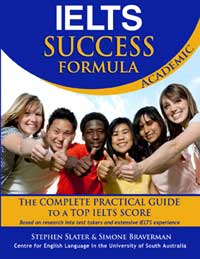IELTS-Blog::IELTS Success Formula Challenge Day 3 |
| IELTS Success Formula Challenge Day 3 Posted: 06 Jun 2014 03:30 AM PDT Welcome to IELTS Success Formula Challenge Day 3. If you've just joined IELTS-Blog today, read about the Challenge here.
“I have a few problems with the Reading sub test. I usually get confused with question types like True/False/Not Given, matching information and completion type of questions. Time management is also a problem, I have never been able to answer all the 40 questions in one hour.”
This is why we devoted a lot of attention to this issue in IELTS Success Formula – and I quote: “Question. What if I'm almost out of time, and I still haven't answered all the questions? Answer. This can (and probably will) happen to you during the first practice sessions. The IELTS Reading test is time-intensive, meaning there is a lot of reading and answering in the 60 minutes, and anyone who doesn't manage their time can end up in this situation. While it's OK to run out of time at home, in the initial stages of your preparation, try not to let it happen to you during the actual exam. Proper time management will help you avoid such scary moments—please refer to I will briefly mention here the 7 Fundamentals (because explaining these principles takes quite a few pages in the book): 1. Skim and scan instead of reading word by word 2. Use the text to guide you to the answers 3. Use words from the text 4. Read in detail only if you have to 5. Pay close attention to task instructions in the test paper 6. Know when to move on 7. Manage your time To manage your time well in the Academic Reading sub test you basically need to do two things: 1. Allocate a certain amount of time to each passage. Since the first passage is normally the easiest it makes sense to allocate the least time to it, then a bit more time to Passage 2, and even more time to Passage 3. Note: this strategy will work better for people with stronger reading skills, but in the book we also offer an alternative strategy for those who have weaker reading skills. 2. Answer the questions on each passage in the most efficient and accurate way to save time. Because this is important, in IELTS Success Formula we give you techniques for answering the difficult question types quickly and accurately. For example, Raminder mentioned True/False/Not Given questions confusing him. Here’s how we suggest to approach this question type. The basic rule is that that if the statement clearly agrees with text, the answer is True, if the statement explicitly contradicts the text, the answer is False, and if the statement says something that the text doesn’t say, it’s Not Given. It works in a very similar way with Yes/No/Not Given. Also, keep in mind that the answers to True/False/Not Given and Yes/No/Not Given questions appear sequentially in the passage. This narrows down the search for you, because once you’ve found the answer to question 1, the answer to question 2 will be somewhere in the sentences that follow, not in the preceding part of the text. Related posts:
|
| IELTS test in Malaysia, Australia and New Zealand – May 2014 (Academic Module) Posted: 05 Jun 2014 11:01 PM PDT Thanks to three IELTS test takers from Malaysia, Australia and New Zealand we have this exam update to share: Section 1. Garbage collection days and types of collected materials. Section 2. Birds observation study and survey sheet. Section 3. Don’t remember. Section 4. A lecture about web courses, including the kind of courses, how and why to study them, and what the main obstacles of this approach can be. Reading test Passage 1. Watkin Tench and the First Fleet voyage. Passage 2. About amateur astronomers that converted info from Saturn and Moon to a better usable image. Passage 3. Four people gave their opinions about Mozart’s music, including amateur and professional musicians.
Writing test Writing task 1 (a report) We were given two maps of a city in 1950 and now. We had to describe the city changes based on the maps. The changes were related to more business district developments, sports areas available, and restaurants and bars available today. Writing task 2 (an essay) Children can learn effectively from watching television, which is why it should be encouraged at school and at home. To what extent do you agree or disagree with this statement? Speaking test Interview - What is your full name? Cue Card Talk about an old friend that you met after a long time you haven’t seen each other. Please say - Who is your friend? Discussion - Why is maintaining friendships good? Related posts:
|
| You are subscribed to email updates from IELTS-Blog To stop receiving these emails, you may unsubscribe now. | Email delivery powered by Google |
| Google Inc., 20 West Kinzie, Chicago IL USA 60610 | |
 Today we’re going to deal with a problem that troubles Raminder from India. He must have it solved to be able to further his studies in Australia:
Today we’re going to deal with a problem that troubles Raminder from India. He must have it solved to be able to further his studies in Australia:

Comments
Post a Comment